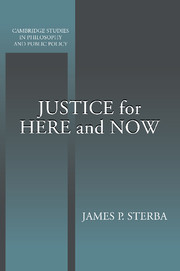Book contents
- Frontmatter
- Contents
- Acknowledgments
- 1 A Peacemaking Way of Doing Philosophy
- 2 From Rationality to Morality
- 3 From Liberty to Equality
- 4 From Equality to Feminism
- 5 From Feminism to Multiculturalism
- 6 From Anthropocentrism to Nonanthropocentrism
- 7 From Just War Theory to Pacifism
- 8 Conclusion: Justice for Here and Now
- Notes
- Bibliography
- Index
3 - From Liberty to Equality
Published online by Cambridge University Press: 08 January 2010
- Frontmatter
- Contents
- Acknowledgments
- 1 A Peacemaking Way of Doing Philosophy
- 2 From Rationality to Morality
- 3 From Liberty to Equality
- 4 From Equality to Feminism
- 5 From Feminism to Multiculturalism
- 6 From Anthropocentrism to Nonanthropocentrism
- 7 From Just War Theory to Pacifism
- 8 Conclusion: Justice for Here and Now
- Notes
- Bibliography
- Index
Summary
Libertarians like to think of themselves as defenders of liberty. F. A. Hayek, for example, sees his work as restating an ideal of liberty for our times. “We are concerned,” says Hayek, “with that condition of men in which coercion of some by others is reduced as much as possible in society.” Similarly, John Hospers believes that libertarianism is “a philosophy of personal liberty – the liberty of each person to live according to his own choices, provided that he does not attempt to coerce others and thus prevent them from living according to their choices.” And Robert Nozick claims that, if a conception of justice goes beyond libertarian “side-constraints,” it cannot avoid the prospect of continually interfering with people's lives.
Libertarians have interpreted their ideal of liberty in two basically different ways. Some, following Herbert Spencer, have (1) taken a right to liberty as basic and (2) derived all other rights from this right to liberty. Others, following John Locke, have (1) taken a set of rights, including typically a right to life and a right to property, as basic and (2) defined liberty as the absence of constraints in the exercise of these rights. Both groups of libertarians regard liberty as the ultimate political ideal, but they do so for different reasons. For Spencerian libertarians, liberty is the ultimate political ideal because all other rights are derived from a right to liberty.
- Type
- Chapter
- Information
- Justice for Here and Now , pp. 41 - 76Publisher: Cambridge University PressPrint publication year: 1998



